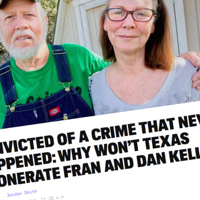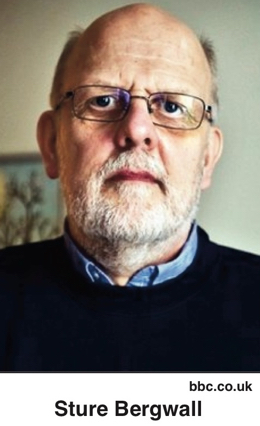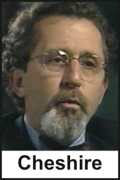Rascals case in brief
In the beginning, in 1989, more than 90 children at the Little Rascals Day Care Center in Edenton, North Carolina, accused a total of 20 adults with 429 instances of sexual abuse over a three-year period. It may have all begun with one parent’s complaint about punishment given her child.
Among the alleged perpetrators: the sheriff and mayor. But prosecutors would charge only Robin Byrum, Darlene Harris, Elizabeth “Betsy” Kelly, Robert “Bob” Kelly, Willard Scott Privott, Shelley Stone and Dawn Wilson – the Edenton 7.
Along with sodomy and beatings, allegations included a baby killed with a handgun, a child being hung upside down from a tree and being set on fire and countless other fantastic incidents involving spaceships, hot air balloons, pirate ships and trained sharks.
By the time prosecutors dropped the last charges in 1997, Little Rascals had become North Carolina’s longest and most costly criminal trial. Prosecutors kept defendants jailed in hopes at least one would turn against their supposed co-conspirators. Remarkably, none did. Another shameful record: Five defendants had to wait longer to face their accusers in court than anyone else in North Carolina history.
Between 1991 and 1997, Ofra Bikel produced three extraordinary episodes on the Little Rascals case for the PBS series “Frontline.” Although “Innocence Lost” did not deter prosecutors, it exposed their tactics and fostered nationwide skepticism and dismay.
With each passing year, the absurdity of the Little Rascals charges has become more obvious. But no admission of error has ever come from prosecutors, police, interviewers or parents. This site is devoted to the issues raised by this case.
On Facebook
Click for earlier Facebook posts archived on this site
Click to go to
Today’s random selection from the Little Rascals Day Care archives….
Click for earlier Facebook posts archived on this site
Click to go to
Today’s random selection from the Little Rascals Day Care archives….
‘Little Rascals case is a study of female/maternal vengeance’

opineseason.wordpress.com
Brian Lambert
Dec. 12, 2017
“Sadly, we’ve grown accustomed to gross miscarriages of justice in cases involving minorities and the indigent. Appalled as we are by such legal travesties we rationalize it as the consequences of traditional bigotry.
“But there is no racial component to the Little Rascals case. There isn’t even much of a class component, since the defendants and their accusers were for the most part, equals. With the exception of a couple jurors, all the characters are white and comfortably middle-class.
“Neither is there any effect of drug abuse or any other kind of aberrant psychology.
“If anything, the Little Rascals case is a study of female/maternal vengeance, since the Kellys’ foremost accusers were Betsy Kelly’s friends, the mothers of the children entrusted to her care. Likewise the vast majority of court-appointed therapists and counselors were female, as was the most prominent of the three prosecutors.
“The story is a riveting study of mass psychosis, of the willingness, ability and need of well- educated, civilized people to believe something in the face of a near total absence of logic and extraordinary cruelty to friends and neighbors….”
– From “A ‘Frontline’ documentary on child abuse hysteria shows how good TV can be” by Brian Lambert in the Saint Paul Pioneer Press (May 27, 1997)
![]()
‘There are no profiles in courage out there’

theintercept.com
The Intercept article
April 25, 2016
“Prosecutors wield extraordinary, unparalleled, and unchecked power. ‘They alone decide who to prosecute for criminal offenses, what charges to bring against them, and what punishments to seek,’ as the National Registry (of Wrongful Convictions) says. ‘In practice, that power extends to convicted defendants as well. If a sitting prosecutor asks the appropriate court to vacate the judgment and dismiss the charges against a defendant … it will happen.’
“But this requires political will. And too often, the will is not there. As (Keith Hampton, attorney for Fran and Dan Keller) notes, convincing a prosecutor that an injustice has happened can be a tough pull: ‘Unless you have DNA – unless you get the DA completely cornered – there are no profiles in courage out there,’ he says.
“Still, the number of exonerations in cases where no crime was actually committed are on the rise – so at least in some jurisdictions, individuals aren’t forever left in the kind of limbo in which the Kellers find themselves. The National Registry includes 540 exonerations in no-crime cases, including 51 exonerations in child sex abuse ‘hysteria’ cases (including Bob Kelly and Dawn Wilson)….”
– From “Convicted of a Crime That Never Happened: Why Won’t Texas Exonerate Fran and Dan Keller?” by Jordan Smith at the Intercept (April 8)
![]()
Sweden examines its mistakes – why doesn’t N.C.?
 Sept. 29, 2015
Sept. 29, 2015
“Thomas Quick was the name adopted by Swedish petty criminal and drug addict Sture Bergwall, who under ‘recovered memory’ therapy, confessed to raping, killing and even eating more than 30 victims (during the 1970s and ’80s).
“These were supposedly reenactments of ‘recovered memories of sexual abuse’ he had experienced as a child.
“Extraordinarily compelling in the dock as a witness to his own ‘crimes’ (which he had never committed), he was convicted of eight murders. He had trawled newspapers for unsolved killings and convinced the Swedish police that he was responsible – even though he never led them to a single body.
“In 2008, his ‘confessions’ were shown to be untrue and by 2013 the last of his convictions was overturned. The Swedish government has ordered an inquiry into this devastating failure of its justice system. There will be lessons in it for our own (British) authorities.”
– From “Is the therapy that brings out false memories behind VIP abuse claims?” by Dominic Lawson in the Daily Mail (Sept. 20)
How about that – a government that wants to examine “the devastating failure of its justice system”! If the State of North Carolina ever felt such an urge, I think I could come up with a case or two that meet that description….
Betsy Kelly wouldn’t succumb to state’s torture
 July 16, 2012
July 16, 2012
“Elizabeth Kelly was denied parole Friday, three months after pleading no contest to charges of sexually abusing children at her Edenton day care.
“Mrs. Kelly, sentenced to seven years, was eligible for parole upon entering prison because she had already served more than two years while awaiting trial.
“Prosecutor Bill Hart said opposition to Mrs. Kelly’s release was heightened by her statements of innocence after entering her plea.
“‘From my work dealing with sex offenders there is no way you can treat a sex offender and restore them to the community until that person admits the wrongness of her actions and takes responsibility….’”
– From the Associated Press, April 16, 1994
From the beginning, the prosecution never missed a chance to tighten the thumbscrews on Betsy Kelly: Plead guilty, implicate your husband or suffer grave consequences. Although she eventually took a plea bargain, she never accommodated Bill Hart’s pious insistence that she admit “the wrongness of her actions.”
In October 1989, about six weeks after her arrest, a hearing had been held in Raleigh on whether Kelly should be forced to move from a mental health unit into Dorm C at women’s prison.
Recalls Faye Sultan, a Charlotte forensic psychologist who testified on her behalf: “She had been found guilty of nothing at that point, but she was being housed in the most isolated, restrictive facility in the prison, where Death Row and disciplinary inmates were housed. Seems a bit unfair, no?”
Sultan testified that Kelly’s “psychological condition is rapidly deteriorating, and in fact she is on the edge of becoming psychotic.”
Why would the state insist on moving a pretrial “safekeeping” defendant to such a hostile environment? “The reason was to pressure Betsy,” says Joe Cheshire, her lawyer. “They didn’t know her very well, did they?”











0 CommentsComment on Facebook